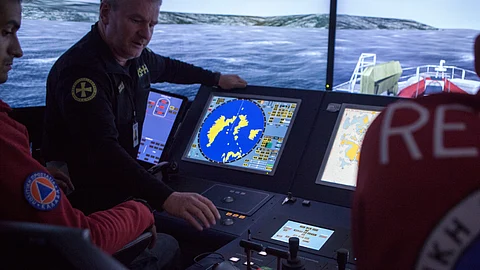COLUMN | Rediscovering old skills: a must in an era of threats to ships' navigation systems [Grey Power]
Global and political uncertainties, (some might call it little short of war) have surely forced ship operators to confront many of its vulnerabilities. Not least has been the almost complete reliance on electronic position finding, and the speed and convenience with which GPS revolutionised navigation since its introduction.
Despite the occasional warnings of over-reliance on this mostly reliable equipment, it is probably fair to suggest little more than lip service is often paid to earnest injunctions to check by alternative means and retain some of the traditional skills in position finding systems not dependent on timing and weak signals from satellites.
The risks from hacking, spoofing and other cyber insecurities have been growing apace, with these being identified as cheap and accessible weapons for hybrid or asymmetric warfare by state agencies through to malicious individual actors. There have been regular warnings about GPS interference in the eastern Mediterranean, the Korean peninsula, mid-eastern waters and, more recently, the Baltic.
All have become more critical with rising global tensions and in recent weeks, at least two serious accidents have been attributed to spoofing of navigational systems. Alerts in the past week have multiplied and magnified such warnings.
Trust in instruments has scarcely been helped by the presence of the so-called “dark fleet,” which operates regularly with the electronic identities of these ships on their sanction-busting clandestine voyages concealed or fraudulent.
Modern navies spend a vast amount on electronic countermeasures to protect their assets from these problems, the sums of which are far beyond the financial capabilities of the commercial sectors.
Nevertheless, in its outfit of basic and probably under-used equipment, any properly operated merchant ship has adequate alternatives available, and, in theory, the skills necessary to make it all work.
Perhaps it was just fortuitous, but administrations that have resisted the siren voices calling in recent years to remove an understanding of the magnetic compass, celestial navigation, and other traditional skills from the examination syllabus, may have done everyone a favour.
It is also worth considering all the other equipment aboard a sophisticated modern merchant ship that might be affected by any external interference and have contingencies in place and rehearsed.
One is reminded of the situation at the end of the last century when everyone was agitated about the “Millennium bug,” although the present problems might well be rather more urgent and likely to be genuine, without the hysteria and hype that accompanied the run-up to 2000 AD.
Other old maritime skills thought to have become redundant might also become relevant once again, although for very different reasons. With the move to save the planet by reducing onboard power, shipping is re-entering the era of the “low-powered steamer,” a term that largely summed up the whole of the tramp fleet during the end of the 19th century and the first half of the last.
Designed for the very minimum speed and fuel consumption, these ships, like their sailing ship predecessors, needed careful handling to keep them safe in adverse weather.
A competent tramp ship master in that era was adept at choosing a course that may not have been the most direct, but would have avoided heavy weather and head winds. Any wind forward of the beam will slow a ship down substantially, something that charterers, even today, have sometimes been reluctant to accept.
Masters of such ships would probably have carried a copy of the essential volume Steamship Passages of the World, which included a comprehensive section specifically designed for “low-powered steamers.” There were curious similarities to the recommended routes for sailing ships, but all were the sum total of reported experience from countless voyages.
It also recognised the important assistance that could be gained on passage from a good understanding of the ocean currents. Better weather forecasting and a deeper understanding of the movement of currents with the seasons are both available to the modern mariner, and this “fully sustainable assistance” deserves to be emphasised afresh.
In more ways than one, today’s circumstances suggest that navigation may be going “back to the future.”


